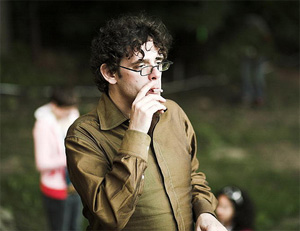Carl Wilson appeared on The Bat Segundo Show #279.
Carl Wilson is the author of Let’s Talk About Love and reports indicate that he is loved, in turn, by the actor James Franco.
Condition of Mr. Segundo: Evading the pomp and circumstance of cultural taxonomies.
Author: Carl Wilson
Subjects Discussed: Celine Dion and incompatible tastes, Elliott Smith, the questioning of canonical knowledge, Paul Valery’s concept of taste composed of a thousand distastes, TV on the Radio, choosing sides when dismissing trash, defying the stereotypes of Celine Dion fans, snobbish record store clerks and zealous fans, anti-snobbery, false dichotomies and cultural advantage, culture and existing power structures, Fiona Apple’s Extraordinary Machine, the Internet and the music industry, fans and cultural capital, Immanuel Kant and “common sense,” cultural consensus, the Beatles, questioning Wilson’s party criteria, middlebrow aesthetes in newspapers, separating the person from the artist, the relationship between vituperative feelings and meeting people, the celebrity-industrial complex, Dion’s 2005 appearance on Larry King, whether or not Larry King mocks his guests, judging a person on a handful of eccentricities, whether it’s possible to see the “real” Celine Dion, reinforcing celebrity image, whether or not personal information about an artist can affect your opinion about the art, Michael Jackson, “classic” vs. contemporary pop culture, the expiration date of scorn, that damn song from Titanic, Celine Dion in Vegas, music and emotional frames of reference, the problems with the word “social” being applied to art, Pierre Bourdieu’s Distinction, the problems with “hip,” coolness and judgment, the Mountain Goats, the perceived “hipness” of alt-music boosters, authenticity, “keeping it real,” and civil disagreement.
(Note: Video excerpt forthcoming.)
EXCERPT FROM SHOW:
 Correspondent: But look at the Beatles and Elvis. I mean, this would seem to me to confirm the ideal conditions. It would be very difficult to find someone who is a music lover who hates the Beatles or the Rolling Stones or Elvis. I mean, there’s a fairly common consensus. Even if you don’t love them, you can at least appreciate the achievement of these bands that just went in and likewise captured the popular consensus. And this is a little bit different from Celine Dion.
Correspondent: But look at the Beatles and Elvis. I mean, this would seem to me to confirm the ideal conditions. It would be very difficult to find someone who is a music lover who hates the Beatles or the Rolling Stones or Elvis. I mean, there’s a fairly common consensus. Even if you don’t love them, you can at least appreciate the achievement of these bands that just went in and likewise captured the popular consensus. And this is a little bit different from Celine Dion.
Wilson: It is.
Correspondent: In which there’s an artistic criteria likewise being applied. So how do you separate this?
Wilson: I mean, it’s different than Celine Dion. And it’s different than Stockhausen. Right? So look at them as poles of a spectrum and the Beatles and Elvis as being somewhere in the center of that spectrum. By the end of the book, there’s a whole essay at the end of the book about taste and different ways of thinking about it and criticism. And the thing, that at the end of this whole process of immersing myself into a different taste world than my own, was that where those big aesthetic disagreements arise, my tendency at this point is to suspect that really it’s a problem of terms. That people are arguing on a different set of assumptions than one another, but that their conclusions are perhaps equally valid. But that doesn’t mean that I think now that Celine Dion and the Beatles are equals. And it would be a whole other sort of chapter of this exploration to figure out where to find some kind of more objective set of measurements for greatness. But if you’re using populism and anti-populism hand in hand, what you do find with people like Elvis and the Beatles, and Louis Armstrong and Ray Charles — you know, they kind of win all of those contests. I’m not saying everything’s the same.
Correspondent: Then what accounts for the aberrative impulse for Celine Dion then?
Wilson: I think that there are things that are confirmed both by elite opinion and populist opinion. And in those cases, it’s kind of good to think, “Oh, well, whichever direction you come from, this gets through the gates.” What explains what doesn’t get through one set of gates and what doesn’t get through another set of gates. And so the book is more concerned with aesthetic disagreement than aesthetic agreement. And it’s a question of when we have these fights. When you’re at a party and somebody’s saying, “This is great,” and you’re saying, “This is terrible,” what are you really talking about? And my suspicion is that you’re talking about something that has more of a deeply autobiographical root than it has any connection to some objective set of markers. But that’s not to say that there might not be works of art that are more profound and universal than others.
Correspondent: But see, Carl, this is where I’m going to have to disagree with you. Because you’re applying a criteria here where if I go to a party to express a particular opinion about music, I’m immediately going to focus in on Celine Dion and absolutely damn her to the skies. When, in fact, in my case, I have not actually thought about Celine Dion in any serious capacity until I read your book. I mean, I largely ignored her. So this is why I’m a little suspicious. I mean, I hear where you’re coming from. But I’m a little suspicious of how you’re applying such a broad brush to how we have tastes and how we express those tastes at parties.
Wilson: Well, it might just be that Celine’s not the best example for you. But maybe Whitney Houston is a good example for you. I think there’s a whole category…
Correspondent: I ignore her too!
Wilson: But that just, to me, speaks to the aesthetic world that you live in — it’s well cordoned off enough from places where you might have to deal with that. But, I mean, the places where I use as examples in setting this up is, in the media, the people who are representatives of our tribe. You know, the aesthetes. Which are middlebrow aesthetes in terms of who’s writing a column in the newspaper. Celine is a very favorite whipping boy.
Correspondent: Whipping boy. Have you looked at her lately?
(Photo credit: David Waldman)
BSS #279: Carl Wilson (Download MP3)
Listen: Play in new window | Download


 Correspondent: You deem Alec Baldwin a celebutard partly because of the infamous voicemail to his daughter. But I’m wondering if it really is fair, given what you’ve just discussed in relation with Sean Penn and his political sentiments, to take something that was never intended for the public and put it up there with something that is actually in the public record. I mean, is it really fair to deem someone a celebutard for their private actions like this?
Correspondent: You deem Alec Baldwin a celebutard partly because of the infamous voicemail to his daughter. But I’m wondering if it really is fair, given what you’ve just discussed in relation with Sean Penn and his political sentiments, to take something that was never intended for the public and put it up there with something that is actually in the public record. I mean, is it really fair to deem someone a celebutard for their private actions like this?